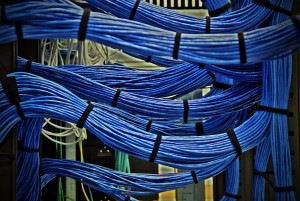When we switch on our computer every morning and settle into our day’s work, we don’t think about what’s happening to supply the data we seek with a click of the mouse. We expect the information is going to show up at the speed of byte, but when it doesn’t, we really notice it.
Compared to the rest of the country, the Granite State gets high marks for its broadband connections, according to the latest State of the Internet Report, issued this week by Akamai*, which found:
– New England made a strong showing in average broadband connection speeds, with Vermont (#1), New Hampshire (#2, with an average connection speed of 12Mbps and 4th for peak connection speeds of 47.1Mbps), Massachusetts and Connecticut in the top 10;
– “Surprisingly high rates of quarterly growth were seen” in broadband adoption … ranging from 25 percent in New York to 42 percent in New Hampshire;
– “In New Hampshire, nearly half of the connections to Akamai were at speeds above 10 Mbps,” which places the Granite State in first place for high broadband adoption (above 10Mbps) and first place for broadband adoption (above 4 Mbps), which represents a change of 65 percent and 6.5 percent respectively.

“Although there is still more work to be done, New Hampshire has made tremendous progress in broadband deployment,” said Carol Miller, director of Broadband Technologies at the Division of Economic Development. “It is testament to New Hampshire’s high-tech industry and provider investments in infrastructure. Broadband expansion and increases in capacity are the result of the innovative market place responding to the needs of a knowledge base economy. New Hampshire has increased broadband availability from 73 percent in 2010 to 88 percent in the first quarter of this year.”
The challenge remains, she said, in getting broadband to the rural areas of New Hampshire, where geography is a factor.
Broadband is an important tool in economic development and businesses and service providers expect what we all expect: Fast and reliable internet connection.
“It improves our ability to recruit and retain business and helps businesses to increase their profitability,” Miller said. “It enhances our quality of life because no matter where we live, we can use to the web to attend college and increase our education and that is attractive to skilled workers.”
Broadband also helps with healthcare monitoring, no matter where you are, and is another to help keep us safe.
“Simply put, broadband brings opportunities to New Hampshire’s economy that might otherwise be missed,” Miller said.
*Akamai’s State of the Internet Report is based on data gathered on its network of more than 250,000 servers. Akamai is a distributed cloud computing platform that’s distributed worldwide.
Lorna Colquhoun
Communications Director
NH Division of Economic Development









